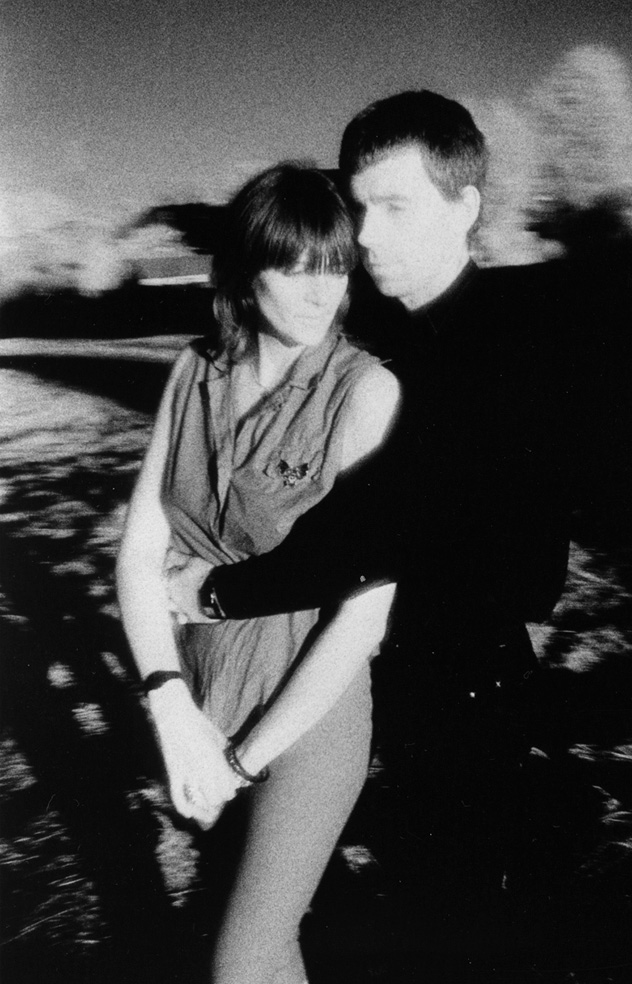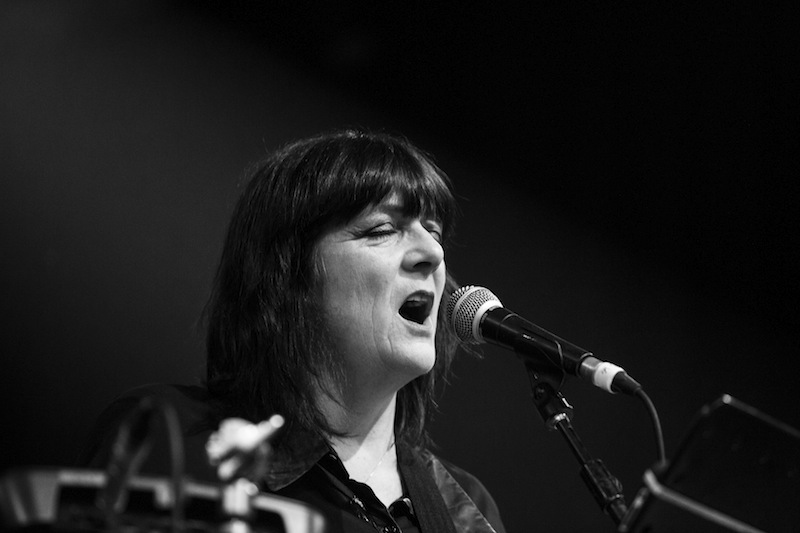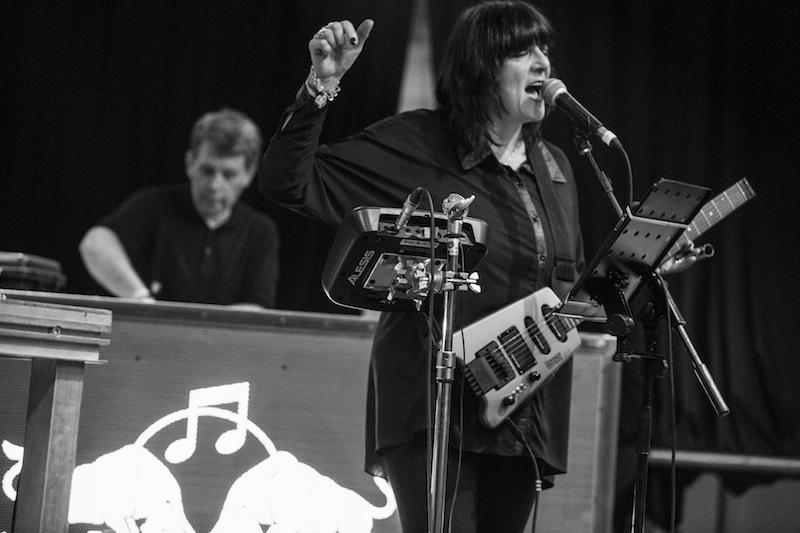Chris Carter and Cosey Fanni Tutti are a living lesson in the rejuvenating power of remaining experimental in art. Their music holds its own alongside the young guns of electronica, who indeed frequently idolise them, and in person they frequently seem as excited about possibilities and open to new ideas as artists just starting out.
The set they played at Sónar festival in Barcelona last weekend was based on the Chris & Cosey songs they wrote throughout the 1980s and 1990s, but deliberately done in the more abstracted electronic style they took on as Carter Tutti from 2000 onwards – fusing two identities. This is the kind of reinvention and subversion they have constantly practiced since their beginnings in the late 1960s and early 1970s in the multimedia deviant art collective COUM Transmissions (who were famously branded “wreckers of Western civilisation” by Conservative MP Nicholas Fairburn), on through Throbbing Gristle, which they formed half of along with Genesis P. Orridge and the late Peter “Sleazy” Christopherson, and even working with an early incarnation of The Eurythmics.
When I met them before their Sónar set, they were surrounded by musicians half their age or less, all alumni of the Red Bull Music Academy, which was curating the SónarDome stage over the weekend, and yet they seemed to fit in very comfortably – as keen to talk about the modern industry and musical networks, and their own forthcoming album that concludes the Carter Tutti Play Chris & Cosey manifstation, as they were to reference their own past. And well they might: they are anything but a heritage act, with projects like their collaborations with fellow electronic band Factory Floor and a live soundtrack at the ICA for Murnau's Faust getting critical and public praise in their own right and not for the duo's perceived prestige.
Watch out for an exclusive stream of Chris & Cosey's RBMA SónarDome show coming soon on theartsdesk.
JOE MUGGS: You always seem to have multiple projects going on – are you working on anything besides your own shows?
 CHRIS CARTER: We've just finished a JG Ballard project which we did in Oslo, two weeks ago. It was a JG Ballard festival and they commissioned us to do a piece especially for that, which was quite nice – as with the Faust soundtrack – because we've been doing the Chris & Cosey material for so long, it's really nice to break off and do something fresh. And that was quite well received, though I don't think they got quite what they'd been expecting us to do, because we did this quite dubby, lo-fi set. It went down well, but we definitely surprised people by doing something we wouldn't normally do, a bit out of our comfort zone.
CHRIS CARTER: We've just finished a JG Ballard project which we did in Oslo, two weeks ago. It was a JG Ballard festival and they commissioned us to do a piece especially for that, which was quite nice – as with the Faust soundtrack – because we've been doing the Chris & Cosey material for so long, it's really nice to break off and do something fresh. And that was quite well received, though I don't think they got quite what they'd been expecting us to do, because we did this quite dubby, lo-fi set. It went down well, but we definitely surprised people by doing something we wouldn't normally do, a bit out of our comfort zone.
COSEY FANNI TUTTI: And we wanted to keep it away from the clichéd things to do with Ballard, the hi-tech sort of stuff.
CC: We had a video projection of him from a really obscure BBC film he did in the seventies, with Gabrielle Drake – who's Nick Drake's sister – acting in it, all based around the Crash stuff, but with him actually in it a lot, narrating it.
CFT: We sampled a lot of him talking and manipulated that to become the sounds that we then created dub out of, so it was all Ballard really. Essence of Ballard. But not what you'd expect, I really didn't want it to sound like musique concrète...
CC: There was a lot of that at the festival as it happened.
Was Ballard an influence on you early on?
CC: More so on me. With the rest of Throbbing Gristle, they were more the Burroughs obsessives; I don't know why that division came about but Sleazy and Gen weren't really into Ballard at all. [To Cosey] I guess you were into both weren't you?
CFT: Yeah, I was.
CC: But yeah, I was really into him. He's very English, somehow, not exotic. He's got this mundane aura about him, but his writing is completely the opposite. I love to hear him talk, too – we went through hours of his audio stuff for this project, which was a real pleasure. I did another project too, with Richard Kerr – we've done two sides of a 12” single, again Ballard-based, which came about shortly after he died, but that's never been released. It's all finished, but it's not our release – it's part of another project so we have to wait for everyone involved to get their ducks in a row.
And what's the current state of play with your own music?
CC: Well we've just finished the new Chris & Cosey album, which is Carter Tutti Plays Chris & Cosey, based on this set that we're doing here today. It's the studio version of this set.
CFT: When we did the American gigs, and we started to remix the old Chris & Cosey stuff for them, a lot of people wanted it. We did it as a super limited thing, just a CD you could buy at gigs. Then again, when we started doing this current set, people asked if we'd do the same thing, they'd ask at gigs if we had CDs for sale. We'd not really thought of it in that sense, this was intended to be a one-off gig at the ICA at first. So to follow the remixes, we decided to do an album of the revamped Chris & Cosey set, so the two things sort of bookend the beginning and... possibly... the end of us playing Chris & Cosey songs live, as we move on to doing Carter Tutti again.
So working on new Carter Tutti material is the next step then?
I don't think it fits any genre now!CFT: Yeah we are. As we've been going along, doing other projects, there'll be certain things we come up with that are obviously more Carter Tutti, or that inspire us to think about what the next Carter Tutti release should be, so we've got a file of a few ideas ready to work from that, and we'll be starting work on that in November, December, ready for release next year.
CC: And we've been doing a lot of remixes, in the last year we've been offered loads of chances to rework other people's stuff – there's a couple more still to do, in fact. Some have been low-key, and some have been really high profile, quite popular.
CFT: It's really difficult, because you'll go along and say to yourself, wait a minute, some of our own projects are still on a shelf and we're doing all this work for other people – but some of them are so exciting you think that it's an opportunity to work with really good people that you just don't want to miss.
CC: Sometimes it's friends, they'll just say “do you want to remix a track off the new album” and it's just “yeah man!” and you're excited because you're hearing the new album before anyone else.
Remix culture, electronic production and so on are completely normal now: do you feel music culture now is more receptive to your way of working than it was?
CC: Oh yes.
CFT: It's more receptive to the original Chris & Cosey material as well! When we released that, people really didn't know what to make of it. Even though we thought it was quite accessible, it was actually the same as when we'd done Industrial [the collectively-run record label] with Throbbing Gristle. You fought with this response each time you went out and did a gig, going “oh here we go again,” wondering if people are going to like it or hate it. Not that we were bothered, but it didn't have a genre to fit into.
CC: I don't think it fits any genre now!
CFT: No, I don't either.
CC: Although, first time around in the eighties and nineties, we were really well received in America and Europe, just not so much in Britain. We toured endlessly in America and Europe, dozens and dozens of gigs, loads of tours, but in the UK people were just “nurrrr”.
CFT: But now people seem to naturally get our sound.
CC: I saw some British press thing recently that said “Carter Tutti: new darlings of...” something or other, and I just thought, wow, what's changed?
CFT: Time to change tack if people start saying things like that, I think!
CC: Yeah [laughs]. But it was darlings of the something-or-other scene, and I thought, bloody hell, I don't think we're any scene's darlings, we're in our sixties now, we're thinking of winding it down a bit...
CFT: We did that in the eighties though, when it started going really well we changed direction and did The Library of Sound, and generally more ambient stuff, then that took off, so we moved away again.
But you're happy to revisit old sounds or identities as you have recently?
 CC: Well yeah, because it's difficult: if people like what you're doing and they make you a decent offer to come and play somewhere nice like this [Barcelona], it's difficult to turn it down. [Laughs] You're just thinking, mmm, do we want to do it any more, then a couple of really nice offers come in, and the people are really nice...
CC: Well yeah, because it's difficult: if people like what you're doing and they make you a decent offer to come and play somewhere nice like this [Barcelona], it's difficult to turn it down. [Laughs] You're just thinking, mmm, do we want to do it any more, then a couple of really nice offers come in, and the people are really nice...
CFT: ...and it's such a nice vibe on stage, it's wonderful when the promoters and audience are really into what you do...
CC: ...so you get swept along.
CFT: Bear in mind most of our career as such we've usually had to fight with the audience, and tell them “you are going to listen to this, because this is what we're doing so take or leave it... byeeeee – or stay and enjoy it.” But now you've got people who've actually grown up with it, and understand our way of working...
CC: ...and they know the tracks: it's fantastic playing somewhere like this and they sing along or shout for other specific tracks.
That raises the question: you've had a history of being seen as a countercultural act, yet here you are at a festival with big corporate sponsors and amazing production values... does that jar at all?
CFT: No, because firstly we were involved with Sónar right when it started, before it became corporate in any way. We really embraced what they were doing and they showed our video work at the very first Sónar. But also it's the Red Bull Music Academy stage that's invited us specifically, and I support what they do.
CC: What are you, a Red Bull associate artist or something?
CFT: I think that's it, yes.
CC: Because she's done a few talks for them and suchlike, she's now got a VIP pass for life.
CFT: I'm very happy to be involved, though, particularly because they provide opportunities for young people who wouldn't have them otherwise – people with real talent but no support or finance for it otherwise. It's fantastic.
CC: They do mentoring, providing free studio space, it's not just pinning their badge on something they perceive to be cool.
CFT: To be honest, I don't know if I'd come here if it was a record label asking me to do some showcase thing...
Well, for a certain section of musicians, having the patronage of – or even just affiliation with – these diffuse entitites like RBMA, or Sónar festival itself, is easily as important as having the right record label. Do you see that as a positive change?
The internet hasn't helped people an awful lot, it swamps thingsCC: Certainly in some ways; it's also the networking thing that happens around these things – you don't just play or participate, but you meet people in the same business and doing the same things who might be able to provide some mutual support.
CFT: Which is necessary for lots of people – but on the other hand, that's not what I'm looking for.
CC: No, but we don't need it any more...
CFT: We never did, though. We created our own little network and we were happy with that world because that was the place that we wanted to inhabit artistically and practically.
CC: It's so difficult for young musicians to make their voice heard now, though. It really is, and if something like this can help people do that then that's great.
CFT: The internet hasn't helped people an awful lot, it swamps things.
CC: Well it has and it hasn't...
CFT: ...yes, it's a double-edged sword, for a lot of reasons.
Who were your support network, aside from the Throbbing Gristle collective?
CFT: Well around then it was people like ATV [Alternative TV], even Adam And The Ants used to borrow our gear, “oh our van's broken down” “that's OK you can use ours” - really simple things like that, but vital to keep going when you're starting out. There was no ego involved with it, no “oh dear if I lend them my musical instrument they might do something better than me and show me up”, none of that. The only time we did do that was... umm...
CC: ...oh yes, Thomas Leer and Robert Rental...
CFT: ...because for The Bridge album they did on Industrial, they wanted to use the studio and use the gear, and we said no. They thought we were being really horrible – but the point was, their music came from the gear that they'd got and used on stage.
CC: We didn't want their sound to change, so we said “just record the album with what you've got, and we'll put the album out.”
CFT: “Use our gear afterwards, but for this album, do what you're doing because it's really good”
CC: “This is what we like, don't change it.”
I think that still exists – especially if you go to relatively far-flung places where people have to build their own scenes.
CFT: Yeah I suppose. In the last ten years things have changed.
CC: That'll be the music industry losing its power!
CFT: This is the problem: something has to give for something to shift in a positive way. Sad but true.















Add comment